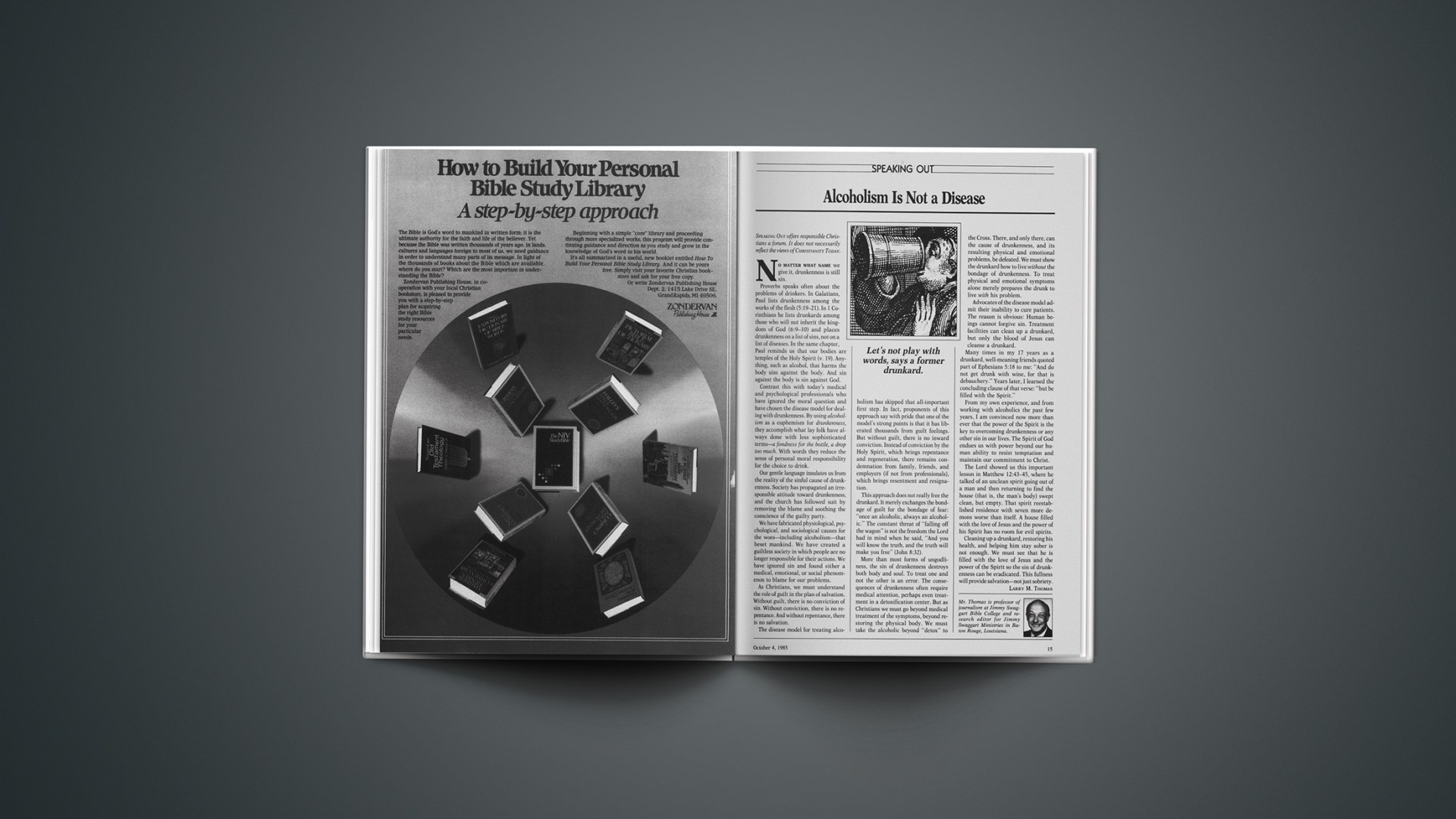SPEAKING OUT offers responsible Christians a forum. It does not necessarily reflect the views of CHRISTIANITY TODAY.
No matter what name we give it, drunkenness is still sin.
Proverbs speaks often about the problems of drinkers. In Galatians, Paul lists drunkenness among the works of the flesh (5:19–21). In 1 Corinthians he lists drunkards among those who will not inherit the kingdom of God (6:9–10) and places drunkenness on a list of sins, not on a list of diseases. In the same chapter, Paul reminds us that our bodies are temples of the Holy Spirit (v. 19). Anything, such as alcohol, that harms the body sins against the body. And sin against the body is sin against God.
Contrast this with today’s medical and psychological professionals who have ignored the moral question and have chosen the disease model for dealing with drunkenness. By using alcoholism as a euphemism for drunkenness, they accomplish what lay folk have always done with less sophisticated terms—a fondness for the bottle, a drop too much. With words they reduce the sense of personal moral responsibility for the choice to drink.
Our gentle language insulates us from the reality of the sinful cause of drunkenness. Society has propagated an irresponsible attitude toward drunkenness, and the church has followed suit by removing the blame and soothing the conscience of the guilty party.
We have fabricated physiological, psychological, and sociological causes for the woes—including alcoholism—that beset mankind. We have created a guiltless society in which people are no longer responsible for their actions. We have ignored sin and found either a medical, emotional, or social phenomenon to blame for our problems.
As Christians, we must understand the role of guilt in the plan of salvation. Without guilt, there is no conviction of sin. Without conviction, there is no repentance. And without repentance, there is no salvation.
The disease model for treating alcoholism has skipped that all-important first step. In fact, proponents of this approach say with pride that one of the model’s strong points is that it has liberated thousands from guilt feelings. But without guilt, there is no inward conviction. Instead of conviction by the Holy Spirit, which brings repentance and regeneration, there remains condemnation from family, friends, and employers (if not from professionals), which brings resentment and resignation.
This approach does not really free the drunkard. It merely exchanges the bondage of guilt for the bondage of fear: “once an alcoholic, always an alcoholic.” The constant threat of “falling off the wagon” is not the freedom the Lord had in mind when he said, “And you will know the truth, and the truth will make you free” (John 8:32).
More than most forms of ungodliness, the sin of drunkenness destroys both body and soul. To treat one and not the other is an error. The consequences of drunkenness often require medical attention, perhaps even treatment in a detoxification center. But as Christians we must go beyond medical treatment of the symptoms, beyond restoring the physical body. We must take the alcoholic beyond “detox” to the Cross. There, and only there, can the cause of drunkenness, and its resulting physical and emotional problems, be defeated. We must show the drunkard how to live without the bondage of drunkenness. To treat physical and emotional symptoms alone merely prepares the drunk to live with his problem.
Advocates of the disease model admit their inability to cure patients. The reason is obvious: Human beings cannot forgive sin. Treatment facilities can clean up a drunkard, but only the blood of Jesus can cleanse a drunkard.
Many times in my 17 years as a drunkard, well-meaning friends quoted part of Ephesians 5:18 to me: “And do not get drunk with wine, for that is debauchery.” Years later, I learned the concluding clause of that verse: “but be filled with the Spirit.”
From my own experience, and from working with alcoholics the past few years, I am convinced now more than ever that the power of the Spirit is the key to overcoming drunkenness or any other sin in our lives. The Spirit of God endues us with power beyond our human ability to resist temptation and maintain our commitment to Christ.
The Lord showed us this important lesson in Matthew 12:43–45, where he talked of an unclean spirit going out of a man and then returning to find the house (that is, the man’s body) swept clean, but empty. That spirit reestablished residence with seven more demons worse than itself. A house filled with the love of Jesus and the power of his Spirit has no room for evil spirits.
Cleaning up a drunkard, restoring his health, and helping him stay sober is not enough. We must see that he is filled with the love of Jesus and the power of the Spirit so the sin of drunkenness can be eradicated. This fullness will provide salvation—not just sobriety.
LARRY M. THOMAS1Mr. Thomas is professor of journalism at Jimmy Swaggart Bible College and research editor for Jimmy Swaggart Ministries in Baton Rouge, Louisiana.



